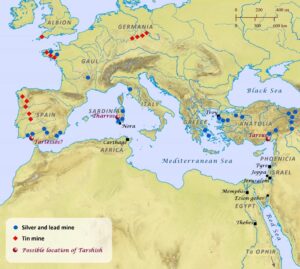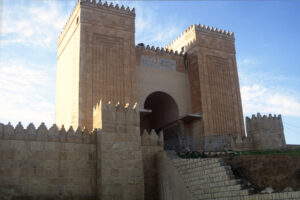
“Now the word of the LORD came to Jonah…saying, “Arise, go to Ninevah.’” (Jonah 1:1)
Many people, both believers and non-believers, are familiar with the story of Jonah from the Old Testament. However, controversy surrounds this well-known book among scholars and other academics.
Some argue Jonah is a historical account, while others suggest it is only symbolic and metaphorical. Still, others believe it is simply a fable full of impossible events.
If it is only a fish story or a metaphorical illustration, why then is it in the Bible, and what can it possibly teach us?
First, let us recall who Jonah was. The Bible and other sources indicate that he was an actual person who came from Galilee in Israel and prophesied to the northern tribes during the time of King Jeroboam II (793-753 B.C.), according to 2 Kings 14:25. His ministry occurred just prior to that of his contemporary, Amos (circa 760 B.C.).
“He restored the territory of Israel from the entrance of Hamath to the Sea of the Arabah, according to the word of the LORD God of Israel, which He had spoken through His servant Jonah the son of Amittai, the prophet who was from Gath Hepher.”
Jonah 1:1 confirms the account, written two hundred years later.
“Now the word of the LORD came to Jonah, the son of Amittai.”
The Lord Jesus also confirms Jonah’s existence in Matthew 12 and Luke 11.
“But He answered and said to them, ‘An evil and adulterous generation seeks after a sign, and no sign will be given to it except the sign of the prophet Jonah. For as Jonah was three days and three nights in the belly of the great fish, so will the Son of Man be three days and three nights in the heart of the earth. The men of Ninevah will rise up in the judgment with this generation and condemn it because they repented at the preaching of Jonah. And indeed, a greater than Jonah is here.” (Mt 12:39-41)
“For as Jonah became a sign to the Ninevites, so also the Son of Man will be to this generation.” (Lk 11:30)
Jesus Says Jonah Existed
Jesus does not refer to Jonah as a fictional character, but as a real human being who served God in the office of prophet. Based on this alone, we can conclude that the book of Jonah is a historical account, yet there is far more evidence.
- Jewish tradition has accepted the book of Jonah as historical for centuries.
- The non-canonical Book of Tobit, fragments of which scientists have discovered among the Dead Sea Scrolls, provides an eyewitness account of Jonah visiting Nineveh (14:4).
- The first-century historian Josephus mentions Jonah in his book Antiquities of the Jews, in which Josephus recalls how Jonah acted as an advisor to King Jeroboam as well as Jonah’s time in the belly of a “whale” (Antiquities IX, 10:1-2).
- Although written in the third person, the Book of Jonah is presented as a narrative, a common form of writing in the Old Testament (e.g., Ex 11:3; 1 Sam 12:11), even if the author himself is the narrator. Therefore, Jonah is likely the author.
- The introduction of Jonah in the third person is similar to the introductions of other minor prophets’ books, such as Hosea, Joel, Micah, Zephaniah, Haggai, and Zechariah.
- The Book of Jonah contains autobiographical information and firsthand accounts of the events and experiences that only Jonah could have known.
Substantial evidence supports Jonah’s physical existence.
Recapping the Story
To quickly recap, Jonah ran from God’s command to go to the ancient city of Nineveh (modern Iraq) to preach repentance (Jon 1:3). Jonah’s reluctance is entirely understandable.
Nineveh was profoundly involved in pagan worship. Those who opposed the king’s gods were brutally tortured and left to die while tied to the city’s walls. Guards denied others food and water until their deaths, only to have their severed heads posted on stakes around the city. Many times, the consequences were far worse. Nineveh was notoriously evil.
One can understand why Jonah did not want to go. In his mind, death awaited him, and, besides, the people of Nineveh were probably well beyond God’s grace anyway. What was the point in going?
So Jonah boarded a ship going to Tarshish, in the opposite direction of Nineveh. Suddenly, a violent storm erupted, causing the Gentile sailors to cast lots to see who was responsible for the trouble. Jonah confessed that God was angry with him and that he was the cause, so they cast him overboard and repented (1:7-16).
Within moments, a great fish swallowed Jonah, and he stayed in the fish’s belly for three days and nights. After repenting from running away, the fish spat Jonah out onto dry land. Several days later, he arrived in Nineveh as an apparently reformed prophet and preached God’s message.
The Metaphorical Argument
Certain scholars and skeptics argue that Jonah’s story is purely metaphorical for several reasons. One is based on Matthew 12:38-41 and Luke 11:29-32 (see above).
Both apostles describe an encounter Jesus had with the scribes and Pharisees, who demanded a sign of astronomical proportions to prove that Jesus is the Son of God. Jesus never performed miracles on demand and certainly not for unbelieving Pharisees. Instead, He gave them a spiritual sign based on Jonah’s experience in the belly of a “great fish” (which Josephus interprets as a whale).
Jonah 1:17 tells us Jonah was in the fish/whale for “three days and three nights.” In Matthew 12, Jesus says He will, similarly, be “in the heart of the earth,” referring to the time encompassing His death and resurrection.
Though skeptics agree upon the duration of Jesus’ death and resurrection, they find it hard to believe that a giant sea creature swallowed a man and spit him out three days and nights later. Somehow, he survived the experience. Surely, that is not possible; therefore, they conclude, the story is only illustrative of important biblical tenets.
Nevertheless, Jesus indicates that it is an actual historical event. If one is to trust Jesus’ words, then one must trust everything He says, even if it seems unusual or unexplainable. If Jesus believes it, then we should, too.
[READ MORE: How the Sign of Jonah Points to Jesus]

Possible Tarshish Locations
Where is Tarshish?
Another reason some believe the story of Jonah is only a fish tale pertains to the distance he covered in a short amount of time. He left Israel and headed to Tarshish. Somewhere out at sea, a fish swallowed and spat him out in an unknown location. Several days later, he arrived in Nineveh.
Many modern scholars and non-scholars alike believe Tarshish is modern-day Tartessos in southern Spain, about 670 miles (1,060 km) west of Israel and 2,500 miles (4,023 km) from Nineveh. Therefore, many ask, how did Jonah get from Israel to Spain, then back to Nineveh in just a few days?
He didn’t. Maybe.
The actual location of Tarshish is unknown.
According to Josephus, Tarshish is “Tarsus” in south-central Turkey, about 15 miles (25 km) from the port city of Mersin along the Mediterranean coast. However, archaeologists describe an inscription attributed to Esarhaddon, the son of Assyria’s King Sennacherib, that refers to a city called “Tarsisi,” located west of Cyprus and Greece. Genesis 10:4 also connects Noah’s grandson, Tarshish, and Cyprus.
“The sons of Javan were Elishah, Tarshish, Kittim, and Dodanim. From these, the coastland peoples of the Gentiles were separated into their lands.”
Others, including early Christian sources, believe Tarshish is either “Tharsis” in northern Africa or a general term for “far-off islands.” Wherever it is, 1 Kings 10:22 describes that ships going to Tarshish would not return for three years, indicating that Tarshish is very far away from Israel. Nevertheless, its actual location remains a mystery.
The Bible’s point is that Jonah sought to get as far away from God as possible. However, many conclude that since Tarshish is (in every direction) very opposite of Nineveh, there is no plausible way he could have traveled to Nineveh in a matter of days.
That is, unless a great sea creature swallowed him.
Jonah’s Mysterious Landing Spot
But where did the fish/whale spit out Jonah?
The Bible indicates that Jonah never made it to Tarshish. Instead, scholars believe the fish/whale returned him to Israel, where he started, to allow him time to repent. Many believe the location is Joppa (modern Jaffa; see Josephus IX, 10:2; Jon 1:3), approximately 6 miles (9 km) south of Tel Aviv.
Though difficult to imagine, Jonah’s time in the fish/whale’s belly makes sense. It gives Jonah ample time to reflect on his disobedience and repent. God did the same thing for the Israelites when He caused them to wander in the wilderness for forty years, looking for the Promised Land (it should have been a three-week journey).
God was trying to teach Jonah, His divinely chosen prophet, a lesson about obedience. Regardless of the time or distance, it seems God took him back to Israel to begin, keeping with His continual character of mercy and grace.
He is the God of second chances.

Jaffa, Israel
Jonah in Ninevah
A third support of the metaphorical argument is how rapidly Jonah walked across Nineveh once he arrived. Jonah 3:4 says the city “was an exceedingly great city, a three-day journey in extent.” How could Jonah have preached to the entire city so quickly?
The Bible does not tell us how long Jonah wandered the city, only that he “began to go through the city one day’s walk” (Jon 3:4).
However, the second part of verse four recalls Jonah crying to the Ninevite people, “Forty more days, and Ninevah will be overthrown!” Scripture authors often use time as a general expression. “Forty days and forty nights,” thus, can mean a time longer than one month. Similarly, Jesus’ use of “three days and three nights” to describe Jonah’s experience inside the fish/whale indicates a short time.
Referring to Jonah 3:4, the prophet plausibly preached God’s call to repentance for all or part of forty days, to which Ninevah positively responded. The people quickly repented (Jon 3:5), followed by the king, causing God to change His mind and not destroy the city.
“But let man and beast be covered with sackcloth and cry mightily to God. Yes, let everyone turn from his evil way and from the violence that is in his hands. Then God saw their works, that they turned from their evil way, and God relented from the disaster that He had said He would bring upon them, and He did not do it.” (3:8, 10)
God’s Mercy
Jonah 4:6-7 provides a fourth support for the metaphorical argument.
“And the LORD God prepared a plant and made it come up over Jonah that it might be shade for his head to deliver him from his misery. So Jonah was grateful for the plant. But as morning dawned the next day, God prepared a worm, and it so damaged the plant that it withered.”
Skeptics quickly point to these verses, declaring that it is impossible for a plant to grow and a worm to destroy it so quickly. Therefore, the metaphor suggests that God cares and shows compassion for those He loves, but He also allows them to experience the consequences of their actions. The lesson is undeniably true, but not in Jonah’s context.
Some translate “misery” in Jonah 4:6 as “discomfort.” The Hebrew word here is ra-ah, which has a variety of meanings. It can mean moral evil (3:8) or judgment (3:10). Here, in Jonah 4:6, it does not mean judgment but “distress.” God caused the plant (presumably a castor plant) to grow rapidly to help Jonah repent of his sour attitude.
But Jonah only sensed the plant’s shade and relief. He failed to realize God’s mercy. His own comfort was more important to him than Nineveh’s repentance. Knowing Jonah’s heart, God sent a worm to destroy the plant (Ezk 17:10) and a bright sun and a hot east wind to stir him to repentance.
Jonah should have learned to love others as yourself (Mt 7:12) and show mercy to his enemies (Mt 5:43-45), but he did not. Perhaps the apostle John sums it up best.
“There is a danger of loving one’s own people more than God. The only way to love God’s people truly is to obey God fully.” (1 John 5:1)

Ancient Nineveh Gate
God is Sovereign
In addition to these examples, those who support the metaphorical argument also suggest that Jonah represents unrepentant Israel and Nineveh represents repentant Gentiles, among several others.
- The Sea = Gentile world of chaos
- Storm = Divine judgment
- Being cast into the sea = Israel in exile
- Fish = Gentile rulers
It is, indeed, a story rich in symbolism.
In some ways, Jonah’s story seems fantastic, created out of someone’s imagination. Many believe it is. But they do not understand God’s power.
God is sovereign and has total control over all creation, which came into existence through Him and responds to His every word. He can use anything He desires, including nature, to accomplish His will and plan. In Jonah’s case, it proves that He extends His love and mercy to all creatures, not only to His chosen people.
Some may still claim the story of Jonah is just a metaphorical fish tale. Truthfully, it contains much symbolism and humanly unimaginable events. But it does not preclude it from being historical, as Jesus implies.
However one views Jonah’s story, one should come away with a reminder of God’s unwavering faithfulness, righteousness, and grace, regardless of their rebellion. He desires for all to come to Him.

It is a very real story, all of the Bible is. I appreciate this site and its biblical teachings.
Thank you, Linda. Many blessings to you.